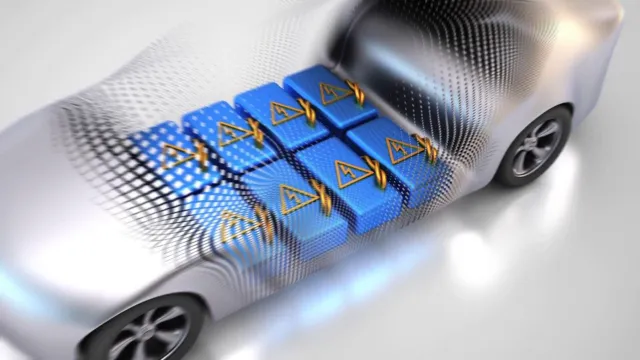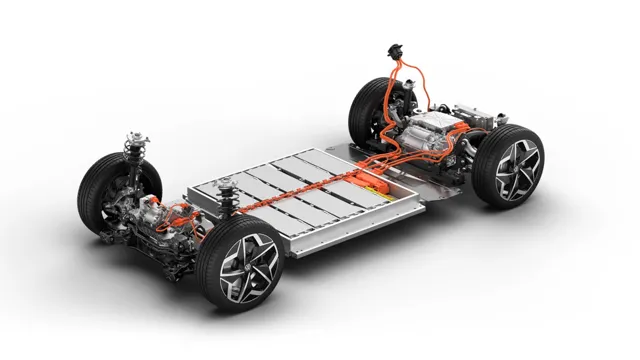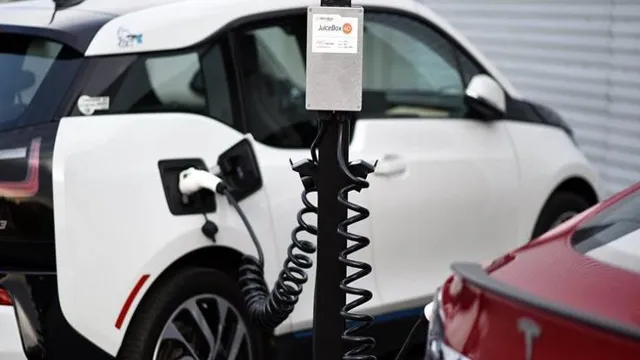Revving Up the Future: Exploring the Latest in Electric Battery-Powered Cars
Are you curious about the electric revolution that is taking the world by storm? Well, you’re not alone! With the push for cleaner, greener energy, more and more people are turning to electric cars as a viable alternative to gas-guzzling vehicles. Batteries have come a long way in recent years, allowing cars to travel farther and faster than ever before. The electric revolution is not just a trend, it’s a movement towards a more sustainable future.
Think about it – just a few years ago, electric cars were seen as a niche product, only affordable and attractive to eco-conscious consumers. Fast forward to today, and they’re quickly becoming mainstream. From Tesla’s sleek and stylish models to more affordable options like the Nissan Leaf and Chevy Bolt, there’s an electric car for every budget and lifestyle.
But it’s not just the cars themselves that are changing – the entire infrastructure is evolving. Governments and businesses are investing in charging stations, making it easier than ever to charge up on the go. And with advancements in battery technology, it’s becoming increasingly feasible to power not only cars, but buses, trucks, and even airplanes with electricity.
So what does this mean for the future of transportation? With climate change becoming an ever-present threat, the shift towards electric vehicles is a crucial step in reducing emissions and slowing the effects of global warming. As the technology continues to improve and prices become more competitive, it’s likely that we’ll see more and more electric cars on the road in the coming years. The electric revolution is here, and it’s exciting to see the positive impact it’s having on the environment and our daily lives.
The Rise of Electric Cars
Over the past few years, we have seen a significant rise in cars featuring electric batteries. With the world shifting towards a more environmentally conscious way of living, more people are opting for sustainable transportation options. Electric cars offer a sustainable solution for personal transportation, as they emit much fewer pollutants into the atmosphere than their traditional gasoline-powered counterparts.
Not only are electric cars better for the environment, but they are also energy-efficient and cost-effective in the long run. Electric cars are becoming increasingly accessible, and as more manufacturers introduce newer models, it is more feasible than ever to own one. As we move towards a greener future, the popularity of electric cars is only expected to rise further, making them a promising and exciting option for car enthusiasts and environmentally conscious individuals alike.
Electric car sales statistics
Electric car sales statistics Electric cars have been on the rise over the past few years, and the numbers speak for themselves. In 2019, global electric vehicle (EV) sales reached a record high of 1 million, representing an increase of 6% from the previous year.
This trend is expected to continue, with analysts projecting that by 2040, electric vehicles will make up 70% of new car sales worldwide. This rapid growth in sales can be attributed to several factors, including improvements in technology, rising environmental concerns, and government incentives for electric vehicle adoption. As battery technology improves and becomes more affordable, electric cars are becoming a more viable option for consumers.
Moreover, concerns about air pollution and climate change have highlighted the importance of reducing carbon emissions in the transport sector, leading many individuals and companies to switch to EVs. Government incentives, such as tax rebates and subsidies, have also played a significant role in making electric cars more accessible and affordable. Overall, the rise of electric cars represents a significant shift in the automotive industry and a promising step towards a more sustainable future.
As more individuals and companies invest in EVs, we can expect to see continued growth in the electric car market and a reduction in carbon emissions from the transport sector.

Environmental benefits of electric cars
Electric cars are rapidly gaining popularity all over the world, and it’s not hard to see why. Apart from being sleek, futuristic, and noiseless, they’re also significantly better for the environment than traditional gasoline-powered vehicles. Electric cars run on electricity stored in powerful batteries, which means they don’t emit harmful pollutants like carbon monoxide and nitrogen oxides that traditional engines produce.
This makes electric cars a cleaner and greener alternative that can help reduce air pollution and improve air quality, especially in urban areas where smog and other pollutants are a constant concern. Additionally, the production of electricity that powers electric cars can be sourced from renewable sources like solar, wind, and hydroelectric, further reducing their carbon footprint. As the technology continues to advance, more and more people are making the switch to electric cars, and it’s exciting to see the positive impact they’re having on the environment.
Electric Batteries and Cars: How They Work
Cars feature electric batteries that function as the power source for the vehicle. These batteries work similarly to the ones in your phone or laptop, but on a larger scale. The electric battery powers the motor, which in turn allows the wheels to move and propels the car forward.
Unlike traditional gasoline engines, electric batteries do not produce emissions, making them a more eco-friendly choice. These batteries have become more popular in recent years due to advancements in technology and a shift towards sustainable practices. They provide a quieter and smoother ride while also offering lower maintenance costs for car owners.
Additionally, electric vehicles commonly come equipped with regenerative braking systems, which conserves energy by converting kinetic energy into electrical energy to recharge the battery. While there are still limitations on range and charging infrastructure, electric batteries are becoming a more viable and appealing option for consumers looking to reduce their carbon footprint without sacrificing performance.
The basics of electric car batteries
Electric car batteries are the powerhouse behind your electric car, supplying the energy necessary for your vehicle to run smoothly. Simply put, they work by converting stored chemical energy into electrical energy. Inside each battery, there are a series of cells that contain positive and negative electrodes, with an electrolyte solution in between.
When the battery is charged, the electrodes become polarized, with the negative electrode losing electrons and the positive electrode gaining them. This polarized state creates a potential difference between the two electrodes, allowing for the flow of electricity between them. This process is reversed when the battery is discharged, with the positive electrode losing electrons back to the negative electrode.
An important factor to consider when it comes to electric car batteries is their range, or how far the car can travel on a single charge. The range is determined by a combination of factors, including the size of the battery, the number of cells inside it, and the efficiency of the electric motor. By understanding the basics of how electric car batteries work, you can make informed decisions about your vehicle and feel confident in your choice to go electric.
Advantages of electric car batteries over traditional engines
Electric car batteries are undoubtedly superior to traditional engines in many ways. For starters, these batteries offer higher energy efficiency, resulting in lower operating costs and reduced carbon emissions. In addition, electric car batteries offer quicker acceleration and provide a smoother, quieter ride than traditional engines.
They are also much simpler in design and require less maintenance, as they have fewer moving parts, no oil changes, and fewer components to wear out. Furthermore, electric batteries have the potential to last longer than traditional engines, as they are not subject to the same wear and tear and can be easily replaced if necessary. Overall, electric car batteries are a game-changer in the automotive industry, offering significant advantages over traditional engines and paving the way for a more sustainable and environmentally-friendly future.
Disadvantages and limitations of electric car batteries
Electric car batteries are undoubtedly a groundbreaking innovation that has the potential to revolutionize the automobile industry. They work by converting stored chemical energy into electrical energy to power the vehicle’s motor. However, like all technologies, electric car batteries have their limitations and disadvantages.
One disadvantage is the issue of range anxiety, which refers to the fear of running out of battery power and being stranded. This is because electric car batteries have a limited range and must be recharged after a certain distance, which can take a significant amount of time. Another disadvantage is the high cost of electric car batteries, which currently makes electric cars more expensive than their gasoline counterparts.
Additionally, the production of electric car batteries involves the use of rare and expensive materials, making it an unsustainable solution for mass adoption. Overall, while electric car batteries offer numerous benefits, their limitations and disadvantages must be considered before making the switch to electric vehicles.
Electric Cars to Watch Out for
Electric cars are becoming increasingly popular, and it’s not hard to see why. With advances in technology, these cars feature electric batteries that provide clean energy alternatives to traditional gas-powered cars. There are a few electric cars to watch out for in particular.
The Tesla Model S is one of the most well-known electric cars on the market, and for good reason. It boasts a range of over 400 miles on a single charge and can accelerate from 0 to 60 in just over 2 seconds. Another notable electric car is the Ford Mustang Mach-E, which offers up to 300 miles of range and has a spacious interior with state-of-the-art technology.
For those in the market for a more affordable option, the Nissan Leaf is a great choice. It has a range of around 150 miles on a single charge and has a sleek, modern design. As more and more automakers invest in electric technology, the options for consumers are only going to continue to grow.
So whether you’re in the market for a luxury car or an affordable option, there’s sure to be an electric car that fits your needs.
Tesla Model S and Model X
Electric cars are no longer a futuristic concept and the Tesla Model S and Model X are among the most popular electric cars on the market today. The Model S, with its sleek design and impressive range, has been a game-changer in the world of electric cars. It features up to a 402-mile range on a single charge, super-fast acceleration, and state-of-the-art technology.
It’s hard to believe that such a powerful car can also be environmentally friendly and energy-efficient. The Model X, on the other hand, has been dubbed the SUV with a conscience. It’s the perfect family car, with seating for up to seven people, plenty of cargo space, and all the safety features you could want – not to mention its impressive range.
Both models have been designed to offer an unmatched driving experience and are sure to be a hit with anyone who loves speed and technology. Overall, with their long-range capabilities and advanced features, the Tesla Model S and Model X are electric cars to watch out for.
Nissan Leaf and Chevy Bolt
The Nissan Leaf and Chevy Bolt are two electric cars that you should definitely keep an eye on. The new and improved Nissan Leaf has a range of up to 226 miles, making it a great option for those who need to travel long distances without worrying about running out of battery life. The Leaf also comes equipped with safety features such as automatic emergency braking and lane departure warning.
Meanwhile, the Chevy Bolt has a range of up to 259 miles, making it one of the longest range electric cars on the market. The Bolt also boasts a spacious interior, which is perfect for families or those who need to haul cargo. Both the Leaf and Bolt are great options for anyone looking to make the switch to electric cars.
These cars are not only good for the environment, but they also offer a great driving experience. So, whether you’re looking for a car that can travel long distances or one that can fit your whole family, the Nissan Leaf and Chevy Bolt are sure to deliver.
The Future of Cars with Electric Batteries
As we move towards a more sustainable future, cars featuring electric batteries are becoming increasingly popular. The environmental benefits of electric cars are undeniable, as they emit zero harmful gases into the atmosphere. However, there are still some concerns about their practicality, such as battery life and charging time.
But with advancements in technology and infrastructure, we can expect to see improvements in these areas. In fact, some electric cars can now travel up to 400 miles on a single charge and can be charged up to 80% in just 30 minutes. As more people switch to electric cars, we can also expect to see more charging stations being built, making it easier to travel long distances.
The future of cars with electric batteries is exciting, and it’s clear that they have the potential to change the way we think about transportation.
Conclusion
In conclusion, with cars now featuring electric batteries, we are truly experiencing a revolutionary shift in the automotive world. Gone are the days of relying solely on fossil fuels to power our vehicles. The future is bright, and with every electric car sold, we are taking one step closer to a greener and more sustainable future.
So let’s buckle up and enjoy the ride, knowing that we are making a meaningful impact on the environment, one charge at a time.”
FAQs
What are the benefits of using electric batteries in cars?
Electric batteries in cars offer numerous advantages over traditional gas-powered vehicles, such as improved fuel efficiency, lower emissions, and reduced maintenance costs.
How long does it take to charge an electric car battery?
The time it takes to charge an electric car battery depends on the size of the battery and the charging station’s power output. Typically, it takes between 30 minutes to several hours to fully charge an electric car battery.
Can electric cars go long distances?
Advances in technology and infrastructure have made it possible for electric cars to travel longer distances. Some electric vehicles can travel up to 400 miles on a single charge, making them a practical option for longer journeys.
What are the main types of electric cars?
There are three main types of electric cars: Battery Electric Vehicles (BEVs), Plug-in Hybrid Electric Vehicles (PHEVs), and Hybrid Electric Vehicles (HEVs). Each type uses different technology to power the vehicle and has its unique benefits and drawbacks.






